- Canton Champion Fibre Company Canton Champion Fibre Company (2308)
- Cherokee Traditions Cherokee Traditions (291)
- Civil War in Southern Appalachia Civil War in Southern Appalachia (165)
- Craft Revival Craft Revival (1942)
- George Masa Collection George Masa Collection (137)
- Great Smoky Mountains - A Park for America Great Smoky Mountains - A Park for America (2900)
- Highlights from Western Carolina University Highlights from Western Carolina University (422)
- Horace Kephart Horace Kephart (941)
- Journeys Through Jackson Journeys Through Jackson (159)
- LGBTQIA+ Archive of Jackson County LGBTQIA+ Archive of Jackson County (85)
- Oral Histories of Western North Carolina Oral Histories of Western North Carolina (314)
- Picturing Appalachia Picturing Appalachia (6797)
- Stories of Mountain Folk Stories of Mountain Folk (413)
- Travel Western North Carolina Travel Western North Carolina (153)
- Western Carolina University Fine Art Museum Vitreograph Collection Western Carolina University Fine Art Museum Vitreograph Collection (129)
- Western Carolina University Herbarium Western Carolina University Herbarium (92)
- Western Carolina University: Making Memories Western Carolina University: Making Memories (738)
- Western Carolina University Publications Western Carolina University Publications (2491)
- Western Carolina University Restricted Electronic Theses and Dissertations Western Carolina University Restricted Electronic Theses and Dissertations (146)
- Western North Carolina Regional Maps Western North Carolina Regional Maps (71)
- World War II in Southern Appalachia World War II in Southern Appalachia (131)
- Faces of Asheville Faces of Asheville (342)
- Forestry in Western North Carolina Forestry in Western North Carolina (1937)
- Grove Park Inn Photograph Collection Grove Park Inn Photograph Collection (355)
- Isaiah Rice Photograph Collection Isaiah Rice Photograph Collection (150)
- Morse Family Chimney Rock Park Collection Morse Family Chimney Rock Park Collection (56)
- Picturing Asheville and Western North Carolina Picturing Asheville and Western North Carolina (4964)
- Allanstand Cottage Industries Allanstand Cottage Industries (62)
- Appalachian National Park Association Appalachian National Park Association (53)
- Bennett, Kelly, 1890-1974 Bennett, Kelly, 1890-1974 (1463)
- Berry, Walter Berry, Walter (76)
- Brasstown Carvers Brasstown Carvers (40)
- Carver, George Washington, 1864?-1943 Carver, George Washington, 1864?-1943 (26)
- Cathey, Joseph, 1803-1874 Cathey, Joseph, 1803-1874 (1)
- Champion Fibre Company Champion Fibre Company (233)
- Champion Paper and Fibre Company Champion Paper and Fibre Company (297)
- Cherokee Indian Fair Association Cherokee Indian Fair Association (16)
- Cherokee Language Program Cherokee Language Program (22)
- Crowe, Amanda Crowe, Amanda (40)
- Edmonston, Thomas Benton, 1842-1907 Edmonston, Thomas Benton, 1842-1907 (7)
- Ensley, A. L. (Abraham Lincoln), 1865-1948 Ensley, A. L. (Abraham Lincoln), 1865-1948 (275)
- Fromer, Irving Rhodes, 1913-1994 Fromer, Irving Rhodes, 1913-1994 (70)
- George Butz (BFS 1907) George Butz (BFS 1907) (46)
- Goodrich, Frances Louisa Goodrich, Frances Louisa (120)
- Grant, George Alexander, 1891-1964 Grant, George Alexander, 1891-1964 (96)
- Heard, Marian Gladys Heard, Marian Gladys (60)
- Kephart, Calvin, 1883-1969 Kephart, Calvin, 1883-1969 (15)
- Kephart, Horace, 1862-1931 Kephart, Horace, 1862-1931 (313)
- Kephart, Laura, 1862-1954 Kephart, Laura, 1862-1954 (39)
- Laney, Gideon Thomas, 1889-1976 Laney, Gideon Thomas, 1889-1976 (439)
- Masa, George, 1881-1933 Masa, George, 1881-1933 (61)
- McElhinney, William Julian, 1896-1953 McElhinney, William Julian, 1896-1953 (44)
- Niggli, Josephina, 1910-1983 Niggli, Josephina, 1910-1983 (10)
- North Carolina Park Commission North Carolina Park Commission (105)
- Osborne, Kezia Stradley Osborne, Kezia Stradley (9)
- Owens, Samuel Robert, 1918-1995 Owens, Samuel Robert, 1918-1995 (11)
- Penland Weavers and Potters Penland Weavers and Potters (36)
- Roberts, Vivienne Roberts, Vivienne (15)
- Roth, Albert, 1890-1974 Roth, Albert, 1890-1974 (142)
- Schenck, Carl Alwin, 1868-1955 Schenck, Carl Alwin, 1868-1955 (1)
- Sherrill's Photography Studio Sherrill's Photography Studio (2565)
- Southern Highland Handicraft Guild Southern Highland Handicraft Guild (127)
- Southern Highlanders, Inc. Southern Highlanders, Inc. (71)
- Stalcup, Jesse Bryson Stalcup, Jesse Bryson (46)
- Stearns, I. K. Stearns, I. K. (213)
- Thompson, James Edward, 1880-1976 Thompson, James Edward, 1880-1976 (226)
- United States. Indian Arts and Crafts Board United States. Indian Arts and Crafts Board (130)
- USFS USFS (683)
- Vance, Zebulon Baird, 1830-1894 Vance, Zebulon Baird, 1830-1894 (1)
- Weaver, Zebulon, 1872-1948 Weaver, Zebulon, 1872-1948 (58)
- Western Carolina College Western Carolina College (230)
- Western Carolina Teachers College Western Carolina Teachers College (282)
- Western Carolina University Western Carolina University (2008)
- Western Carolina University. Mountain Heritage Center Western Carolina University. Mountain Heritage Center (18)
- Whitman, Walt, 1819-1892 Whitman, Walt, 1819-1892 (10)
- Wilburn, Hiram Coleman, 1880-1967 Wilburn, Hiram Coleman, 1880-1967 (73)
- Williams, Isadora Williams, Isadora (3)
- Cain, Doreyl Ammons Cain, Doreyl Ammons (0)
- Crittenden, Lorraine Crittenden, Lorraine (0)
- Rhodes, Judy Rhodes, Judy (0)
- Smith, Edward Clark Smith, Edward Clark (0)
- 1700s 1700s (4)
- 1800s 1800s (36)
- 1810s 1810s (2)
- 1820s 1820s (3)
- 1830s 1830s (5)
- 1840s 1840s (5)
- 1850s 1850s (26)
- 1860s 1860s (188)
- 1870s 1870s (28)
- 1880s 1880s (114)
- 1890s 1890s (342)
- 1900s 1900s (1394)
- 1910s 1910s (1002)
- 1920s 1920s (2719)
- 1930s 1930s (4525)
- 1940s 1940s (2400)
- 1950s 1950s (1820)
- 1960s 1960s (1225)
- 1970s 1970s (1011)
- 1980s 1980s (661)
- 1990s 1990s (532)
- 2000s 2000s (469)
- 2010s 2010s (309)
- 2020s 2020s (66)
- 1600s 1600s (0)
- Appalachian Region, Southern Appalachian Region, Southern (2940)
- Asheville (N.C.) Asheville (N.C.) (1944)
- Avery County (N.C.) Avery County (N.C.) (26)
- Blount County (Tenn.) Blount County (Tenn.) (195)
- Buncombe County (N.C.) Buncombe County (N.C.) (1680)
- Cherokee County (N.C.) Cherokee County (N.C.) (283)
- Clay County (N.C.) Clay County (N.C.) (556)
- Graham County (N.C.) Graham County (N.C.) (238)
- Great Smoky Mountains National Park (N.C. and Tenn.) Great Smoky Mountains National Park (N.C. and Tenn.) (525)
- Haywood County (N.C.) Haywood County (N.C.) (3571)
- Henderson County (N.C.) Henderson County (N.C.) (70)
- Jackson County (N.C.) Jackson County (N.C.) (4919)
- Knox County (Tenn.) Knox County (Tenn.) (35)
- Knoxville (Tenn.) Knoxville (Tenn.) (13)
- Lake Santeetlah (N.C.) Lake Santeetlah (N.C.) (10)
- Macon County (N.C.) Macon County (N.C.) (421)
- Madison County (N.C.) Madison County (N.C.) (216)
- McDowell County (N.C.) McDowell County (N.C.) (39)
- Mitchell County (N.C.) Mitchell County (N.C.) (135)
- Polk County (N.C.) Polk County (N.C.) (35)
- Qualla Boundary Qualla Boundary (982)
- Rutherford County (N.C.) Rutherford County (N.C.) (78)
- Swain County (N.C.) Swain County (N.C.) (2185)
- Transylvania County (N.C.) Transylvania County (N.C.) (270)
- Watauga County (N.C.) Watauga County (N.C.) (12)
- Waynesville (N.C.) Waynesville (N.C.) (86)
- Yancey County (N.C.) Yancey County (N.C.) (72)
- aerial photographs Aerial Photographs (3)
- aerial views Aerial Views (60)
- albums (books) Albums (books) (4)
- articles Articles (1)
- artifacts (object genre) Artifacts (object Genre) (228)
- bibliographies Bibliographies (1)
- biography (general genre) Biography (general Genre) (2)
- cards (information artifacts) Cards (information Artifacts) (38)
- clippings (information artifacts) Clippings (information Artifacts) (191)
- copybooks (instructional materials) Copybooks (instructional Materials) (3)
- crafts (art genres) Crafts (art Genres) (622)
- depictions (visual works) Depictions (visual Works) (21)
- design drawings Design Drawings (1)
- drawings (visual works) Drawings (visual Works) (185)
- envelopes Envelopes (73)
- exhibitions (events) Exhibitions (events) (1)
- facsimiles (reproductions) Facsimiles (reproductions) (1)
- fiction (general genre) Fiction (general Genre) (4)
- financial records Financial Records (12)
- fliers (printed matter) Fliers (printed Matter) (67)
- glass plate negatives Glass Plate Negatives (381)
- guidebooks Guidebooks (2)
- internegatives Internegatives (10)
- interviews Interviews (815)
- land surveys Land Surveys (102)
- letters (correspondence) Letters (correspondence) (1013)
- manuscripts (documents) Manuscripts (documents) (618)
- maps (documents) Maps (documents) (177)
- memorandums Memorandums (25)
- minutes (administrative records) Minutes (administrative Records) (59)
- negatives (photographs) Negatives (photographs) (6090)
- newsletters Newsletters (1290)
- newspapers Newspapers (2)
- notebooks Notebooks (8)
- occupation currency Occupation Currency (1)
- paintings (visual works) Paintings (visual Works) (1)
- pen and ink drawings Pen And Ink Drawings (1)
- periodicals Periodicals (193)
- personal narratives Personal Narratives (10)
- photographs Photographs (12976)
- plans (maps) Plans (maps) (1)
- poetry Poetry (5)
- portraits Portraits (4568)
- postcards Postcards (329)
- programs (documents) Programs (documents) (181)
- publications (documents) Publications (documents) (2443)
- questionnaires Questionnaires (65)
- relief prints Relief Prints (26)
- sayings (literary genre) Sayings (literary Genre) (1)
- scrapbooks Scrapbooks (282)
- sheet music Sheet Music (2)
- slides (photographs) Slides (photographs) (402)
- songs (musical compositions) Songs (musical Compositions) (2)
- sound recordings Sound Recordings (796)
- specimens Specimens (92)
- speeches (documents) Speeches (documents) (18)
- tintypes (photographs) Tintypes (photographs) (8)
- transcripts Transcripts (322)
- video recordings (physical artifacts) Video Recordings (physical Artifacts) (23)
- text messages Text Messages (0)
- A.L. Ensley Collection A.L. Ensley Collection (275)
- Appalachian Industrial School Records Appalachian Industrial School Records (7)
- Appalachian National Park Association Records Appalachian National Park Association Records (336)
- Axley-Meroney Collection Axley-Meroney Collection (2)
- Bayard Wootten Photograph Collection Bayard Wootten Photograph Collection (20)
- Bethel Rural Community Organization Collection Bethel Rural Community Organization Collection (7)
- Blumer Collection Blumer Collection (5)
- C.W. Slagle Collection C.W. Slagle Collection (20)
- Canton Area Historical Museum Canton Area Historical Museum (2110)
- Carlos C. Campbell Collection Carlos C. Campbell Collection (462)
- Cataloochee History Project Cataloochee History Project (64)
- Cherokee Studies Collection Cherokee Studies Collection (4)
- Daisy Dame Photograph Album Daisy Dame Photograph Album (5)
- Daniel Boone VI Collection Daniel Boone VI Collection (1)
- Doris Ulmann Photograph Collection Doris Ulmann Photograph Collection (112)
- Elizabeth H. Lasley Collection Elizabeth H. Lasley Collection (1)
- Elizabeth Woolworth Szold Fleharty Collection Elizabeth Woolworth Szold Fleharty Collection (4)
- Frank Fry Collection Frank Fry Collection (95)
- George Masa Collection George Masa Collection (173)
- Gideon Laney Collection Gideon Laney Collection (452)
- Hazel Scarborough Collection Hazel Scarborough Collection (2)
- Hiram C. Wilburn Papers Hiram C. Wilburn Papers (28)
- Historic Photographs Collection Historic Photographs Collection (236)
- Horace Kephart Collection Horace Kephart Collection (861)
- Humbard Collection Humbard Collection (33)
- Hunter and Weaver Families Collection Hunter and Weaver Families Collection (1)
- I. D. Blumenthal Collection I. D. Blumenthal Collection (4)
- Isadora Williams Collection Isadora Williams Collection (4)
- Jesse Bryson Stalcup Collection Jesse Bryson Stalcup Collection (47)
- Jim Thompson Collection Jim Thompson Collection (224)
- John B. Battle Collection John B. Battle Collection (7)
- John C. Campbell Folk School Records John C. Campbell Folk School Records (80)
- John Parris Collection John Parris Collection (6)
- Judaculla Rock project Judaculla Rock project (2)
- Kelly Bennett Collection Kelly Bennett Collection (1482)
- Love Family Papers Love Family Papers (11)
- Major Wiley Parris Civil War Letters Major Wiley Parris Civil War Letters (3)
- Map Collection Map Collection (12)
- McFee-Misemer Civil War Letters McFee-Misemer Civil War Letters (34)
- Mountain Heritage Center Collection Mountain Heritage Center Collection (4)
- Norburn - Robertson - Thomson Families Collection Norburn - Robertson - Thomson Families Collection (44)
- Pauline Hood Collection Pauline Hood Collection (7)
- Pre-Guild Collection Pre-Guild Collection (2)
- Qualla Arts and Crafts Mutual Collection Qualla Arts and Crafts Mutual Collection (12)
- R.A. Romanes Collection R.A. Romanes Collection (681)
- Rosser H. Taylor Collection Rosser H. Taylor Collection (1)
- Samuel Robert Owens Collection Samuel Robert Owens Collection (94)
- Sara Madison Collection Sara Madison Collection (144)
- Sherrill Studio Photo Collection Sherrill Studio Photo Collection (2558)
- Smoky Mountains Hiking Club Collection Smoky Mountains Hiking Club Collection (616)
- Stories of Mountain Folk - Radio Programs Stories of Mountain Folk - Radio Programs (374)
- The Reporter, Western Carolina University The Reporter, Western Carolina University (510)
- Venoy and Elizabeth Reed Collection Venoy and Elizabeth Reed Collection (16)
- WCU Gender and Sexuality Oral History Project WCU Gender and Sexuality Oral History Project (32)
- WCU Mountain Heritage Center Oral Histories WCU Mountain Heritage Center Oral Histories (25)
- WCU Oral History Collection - Mountain People, Mountain Lives WCU Oral History Collection - Mountain People, Mountain Lives (71)
- WCU Students Newspapers Collection WCU Students Newspapers Collection (1923)
- Western North Carolina Tomorrow Black Oral History Project Western North Carolina Tomorrow Black Oral History Project (69)
- William Williams Stringfield Collection William Williams Stringfield Collection (2)
- Zebulon Weaver Collection Zebulon Weaver Collection (109)
- African Americans African Americans (390)
- Appalachian Trail Appalachian Trail (35)
- Artisans Artisans (521)
- Cherokee art Cherokee art (84)
- Cherokee artists -- North Carolina Cherokee artists -- North Carolina (10)
- Cherokee language Cherokee language (21)
- Cherokee pottery Cherokee pottery (101)
- Cherokee women Cherokee women (208)
- Church buildings Church buildings (190)
- Civilian Conservation Corps (U.S.) Civilian Conservation Corps (U.S.) (111)
- College student newspapers and periodicals College student newspapers and periodicals (2012)
- Dams Dams (108)
- Dance Dance (1023)
- Education Education (222)
- Floods Floods (61)
- Folk music Folk music (1015)
- Forced removal, 1813-1903 Forced removal, 1813-1903 (2)
- Forest conservation Forest conservation (220)
- Forests and forestry Forests and forestry (1197)
- Gender nonconformity Gender nonconformity (4)
- Great Smoky Mountains National Park (N.C. and Tenn.) Great Smoky Mountains National Park (N.C. and Tenn.) (181)
- Hunting Hunting (46)
- Landscape photography Landscape photography (25)
- Logging Logging (119)
- Maps Maps (83)
- Mines and mineral resources Mines and mineral resources (9)
- North Carolina -- Maps North Carolina -- Maps (18)
- Paper industry Paper industry (38)
- Postcards Postcards (255)
- Pottery Pottery (135)
- Railroad trains Railroad trains (72)
- Rural electrification -- North Carolina, Western Rural electrification -- North Carolina, Western (3)
- School integration -- Southern States School integration -- Southern States (2)
- Segregation -- North Carolina, Western Segregation -- North Carolina, Western (5)
- Slavery Slavery (5)
- Sports Sports (452)
- Storytelling Storytelling (243)
- Waterfalls -- Great Smoky Mountains (N.C. and Tenn.) Waterfalls -- Great Smoky Mountains (N.C. and Tenn.) (66)
- Weaving -- Appalachian Region, Southern Weaving -- Appalachian Region, Southern (280)
- Wood-carving -- Appalachian Region, Southern Wood-carving -- Appalachian Region, Southern (328)
- World War, 1939-1945 World War, 1939-1945 (173)
Western Carolina University
Canton Champion Fibre Company
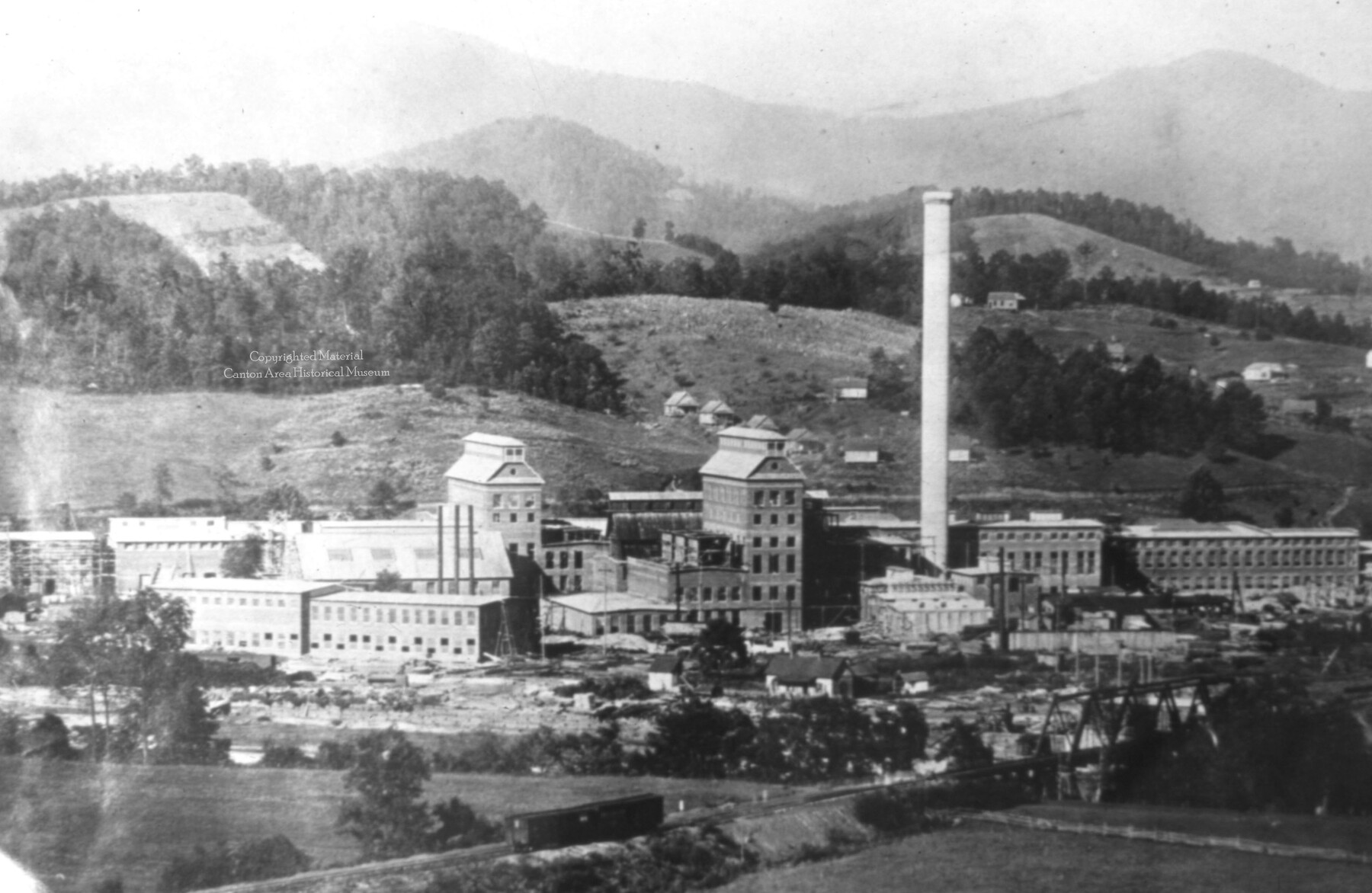
When it opened in 1908, the Champion Fibre Company was the largest pulp mill in the world. For 60 years it was under the leadership of Reuben "Mr. Champion" B. Robertson and was a source of employment, a site of innovation, and a hub of community life for the town of Canton. The population of Canton tripled in size between the start of construction and the opening of the mill and the local economy flourished. The presence and economic power of the mill was the driving force for the paving of Canton's streets, the installation of water and sewer lines, and the establishment of public transportation. The mill shielded Canton from the worst effects of the Clutch Plague. During World War II the mill provided employment for women and jobs were kept waiting for the men who left home to serve. It was the first mill to make white pulp from chestnut wood, one of the first mills to establish a paper chemistry research laboratory; it installed and operated the world's largest book-paper machine in 1933; and, by 1934, it had become the first mill to make high-quality white pulp from southern pine.
In addition to its industrial and economic impacts, the Champion Fibre Company played a crucial role in the environmental future of Haywood County. From 1910 to 1913 the mill provided housing and research for Carl Schenck and the Biltmore Forestry School at the Sunburst logging camp. In 1920, Champion hired Walter Julius Damtoft, one of the nation's first professional industrial foresters and the first trained forester to be employed by a pulping enterprise in the southeast. The mill was also instrumental in the formation of the Great Smoky Mountains National Park, selling over 90,000 acres of land in 1931. Lastly, the mill was active in forestry conservation, allocating over 5,000 acres of its land for reforestation.
Champion was central to life in Haywood County. The mill not only provided economic stability and security but was the linch pin of social life. The major social hub was Canton's YMCA, built with private funds by Peter G. Thomson, Robertson's father-in-law and owner of the Champion Coater Paper Company, the mill's parent company. It opened in 1920 and was the largest facility of its kind west of Charlotte. Robertson donated the land for the Canton Public Library, now home to the Canton Historical Museum, in the 1950s. Snug Harbor, a social center for Champion retirees, opened in 1953. Robertson also donated the land for Camp Hope - a 100+ acre parcel of land that has been open to citizens of Haywood County for over 90 years.
On March 9, 2023, the current owner of the papermill, Pactiv Evergreen, announced it would be closing the Canton and Waynesville plants, which employed about 1,200 people. The mill’s whistle blew for the last time on May 24 and the plant officially shut down on June 8, 2023.
Browse the Champion publication "The Log"
Browse oral histories with Champion mill workers
Browse photographs of the town of Canton and the Champion mill
Browse records (2862)
-
Medical department for Champion employees
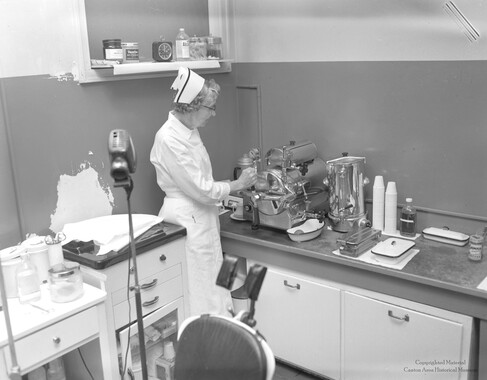
WCU - Canton Champion Fibre... Canton Champion Fibre... Canton Champion Fibre Company
Medical department for Champion employees
1959
-
The Log Vol. 15 No. 04

WCU - Canton Champion Fibre... Canton Champion Fibre... Canton Champion Fibre Company
The Log Vol. 15 No. 04
1932-05;
-
Log feature on wood hauler Adam Scott
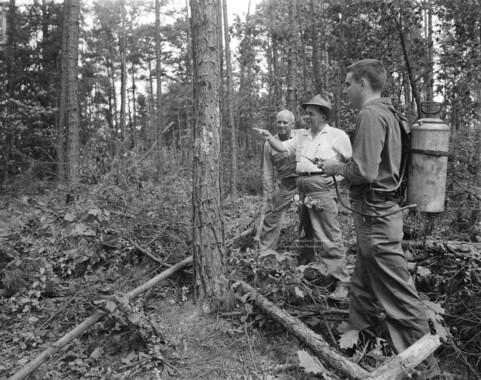
WCU - Canton Champion Fibre... Canton Champion Fibre... Canton Champion Fibre Company
Log feature on wood hauler Adam Scott
1955-12;
-
Family groups: L. C. McDowell
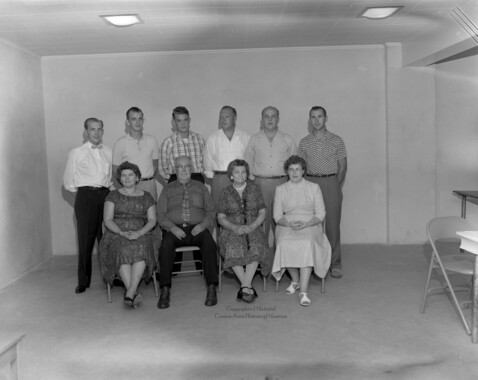
WCU - Canton Champion Fibre... Canton Champion Fibre... Canton Champion Fibre Company
Family groups: L. C. McDowell
1959;
-
The Log Vol. 27 No. 06

WCU - Canton Champion Fibre... Canton Champion Fibre... Canton Champion Fibre Company
The Log Vol. 27 No. 06
1945-07;
-
Bottom of pulp beater

WCU - Canton Champion Fibre... Canton Champion Fibre... Canton Champion Fibre Company
Bottom of pulp beater
-
The Log Vol. 1 No. 1
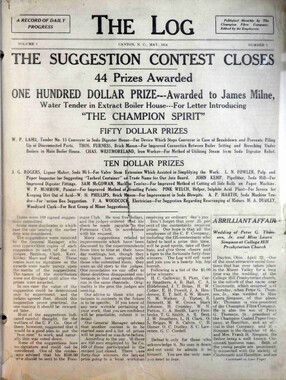
WCU - Canton Champion Fibre... Canton Champion Fibre... Canton Champion Fibre Company
The Log Vol. 1 No. 1
-
Dogwood Blossom Festival horse show
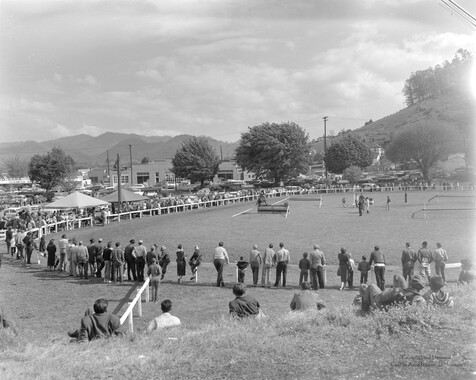
WCU - Canton Champion Fibre... Canton Champion Fibre... Canton Champion Fibre Company
Dogwood Blossom Festival horse show
1960-05-08
-
Rod locomotive number 7

WCU - Canton Champion Fibre... Canton Champion Fibre... Canton Champion Fibre Company
Rod locomotive number 7
circa 1920
-
Reuben Robertson, at 91, a legend
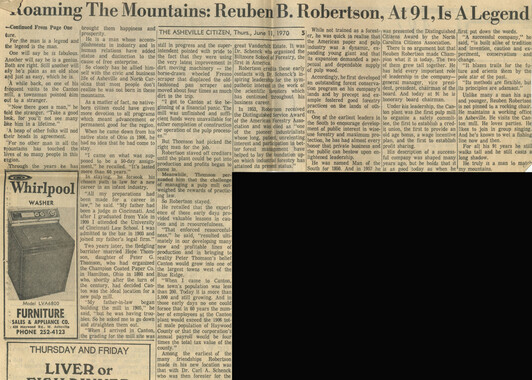
WCU - Canton Champion Fibre... Canton Champion Fibre... Canton Champion Fibre Company
Reuben Robertson, at 91, a legend
-
The Canton Enterprise Volume 13 Number 01

WCU - Canton Champion Fibre... Canton Champion Fibre... Canton Champion Fibre Company
The Canton Enterprise Volume 13 Number 01
-
Southern regional softball tournament

WCU - Canton Champion Fibre... Canton Champion Fibre... Canton Champion Fibre Company
Southern regional softball tournament
1956;
-
Canton Labor Day celebration 1959
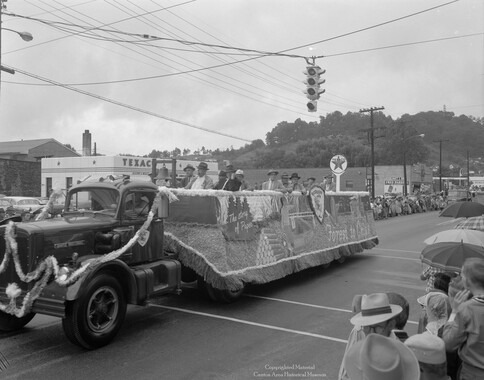
WCU - Canton Champion Fibre... Canton Champion Fibre... Canton Champion Fibre Company
Canton Labor Day celebration 1959
1959-09-07
-
Conveyor house under construction
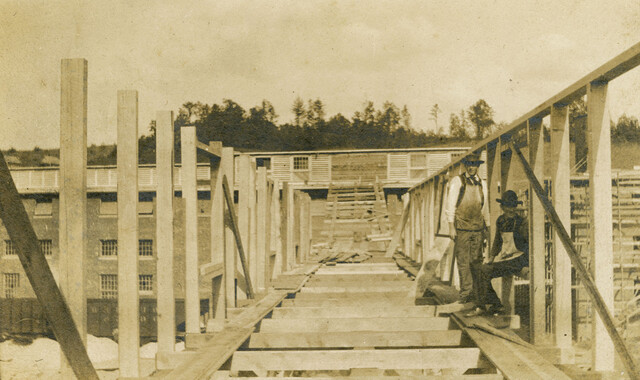
WCU - Canton Champion Fibre... Canton Champion Fibre... Canton Champion Fibre Company
Conveyor house under construction
-
The Canton Enterprise Volume 41 Number 38

WCU - Canton Champion Fibre... Canton Champion Fibre... Canton Champion Fibre Company
The Canton Enterprise Volume 41 Number 38
-
The Log Vol. 8 No. 08

WCU - Canton Champion Fibre... Canton Champion Fibre... Canton Champion Fibre Company
The Log Vol. 8 No. 08
1925-09;
-
Stream improvement
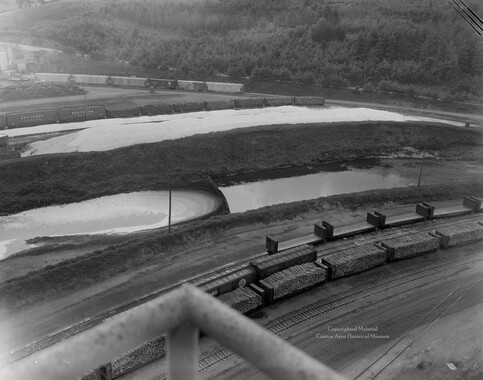
WCU - Canton Champion Fibre... Canton Champion Fibre... Canton Champion Fibre Company
Stream improvement
1965-08-02
-
The Log Vol. 37 No. 02

WCU - Canton Champion Fibre... Canton Champion Fibre... Canton Champion Fibre Company
The Log Vol. 37 No. 02
1954-02;
-
New dryers and size press installed on No. 12 machine
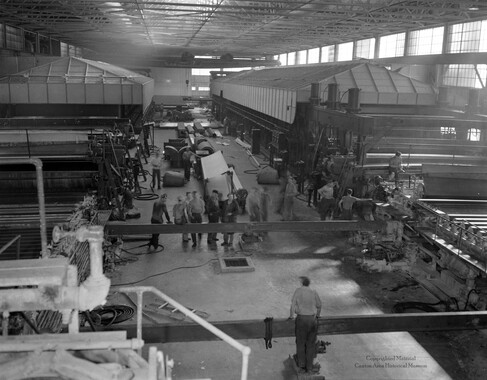
WCU - Canton Champion Fibre... Canton Champion Fibre... Canton Champion Fibre Company
New dryers and size press installed on No. 12...
1950-02
-
The Log Vol. 43 No. 06

WCU - Canton Champion Fibre... Canton Champion Fibre... Canton Champion Fibre Company
The Log Vol. 43 No. 06
1960-06;